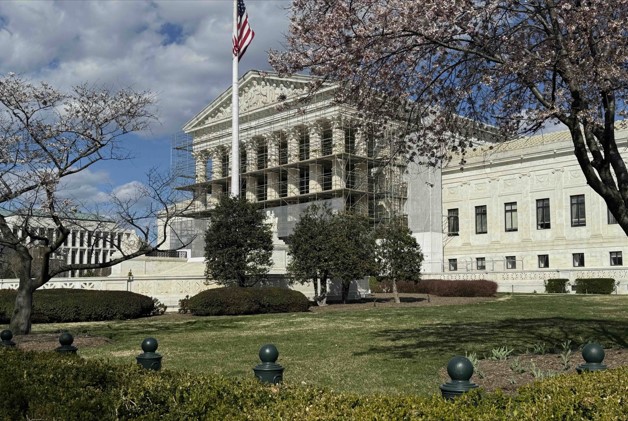Supreme Court Deliberates on Universal Service Fund’s Federal Program
Published on March 27, 2025
at 11:24 am
The court met for nearly three hours of arguments on Wednesday. (Katie Barlow)
Overview of the Case
On March 27, the Supreme Court held oral arguments regarding a legal challenge to the federal program designed to provide affordable telecommunications services to schools, libraries, and underserved communities. The conservative group Consumers’ Research contended that the program infringes on the Constitution by improperly delegating Congressional authority to the Federal Communications Commission (FCC) and a privately operated nonprofit.
Universal Service Fund Established by Congress
The Universal Service Fund was initiated under the Telecommunications Act of 1996, aiming to guarantee uniform access to telecommunications services across the United States, including for institutions like schools and libraries. Managed by the Universal Service Administrative Company (USAC), a nonprofit that works under FCC oversight, the Fund is supported through contributions from telecommunications carriers, which are subsequently passed onto consumers.
The Argument by Consumers’ Research
In four separate challenges across appeals courts, Consumers’ Research claimed that the delegation of authority from Congress to the FCC, and subsequently from the FCC to USAC, violates the nondelegation doctrine—a legal principle questioning the extent to which Congress can delegate its legislative powers. A recent ruling from the U.S. Court of Appeals for the 5th Circuit favored the organization, suggesting that this dual delegation likely contravenes constitutional guidelines.
Government Defense of the Federal Program
Acting U.S. Solicitor General Sarah Harris defended the program, clarifying that Congress has established clear parameters for the FCC’s role and responsibilities regarding universal service. According to Harris, the law delineates explicit policies and procedures, including fee structures designed to ensure equitable services across different demographics, thereby countering accusations of broad and unchecked governmental delegation.
Key Points Raised During Oral Arguments
During the proceedings, the justices expressed varied viewpoints:
- Justice Clarence Thomas raised questions about limitations on revenue generation under the existing program.
- Justice Brett Kavanaugh debated the effectiveness of imposing caps on the fund’s revenue, questioning what specific constraints would be more beneficial than the current requirement of sufficiency for program costs.
- Justice Amy Coney Barrett suggested that arbitrary numerical caps might not provide meaningful limits on government actions.
Concerns Over Accountability and Oversight
Justice Samuel Alito expressed reservations about potential mismanagement within USAC, asserting that the commission’s oversight might not be as thorough as the government suggested. He pointed out that instances of FCC approval of USAC’s recommendations seemed to lack rigorous scrutiny.
Impact of the Court’s Decision
Clement, representing telecommunications interests, cautioned that a ruling favoring Consumers’ Research might result in detrimental effects for the program’s beneficiaries, which include remote and low-income communities throughout the nation. Justice Ketanji Brown Jackson further highlighted that invalidating the program could jeopardize other similar federally regulated revenue-generating programs.
Conclusion
The Supreme Court’s deliberation on this matter will not only have significant implications for telecommunications services across the United States but may also set precedents regarding the limits of Congressional delegation of authority. As the justices continue to weigh the arguments presented, the outcome of this case could redefine the balance of power between federal agencies and legislative oversight.

